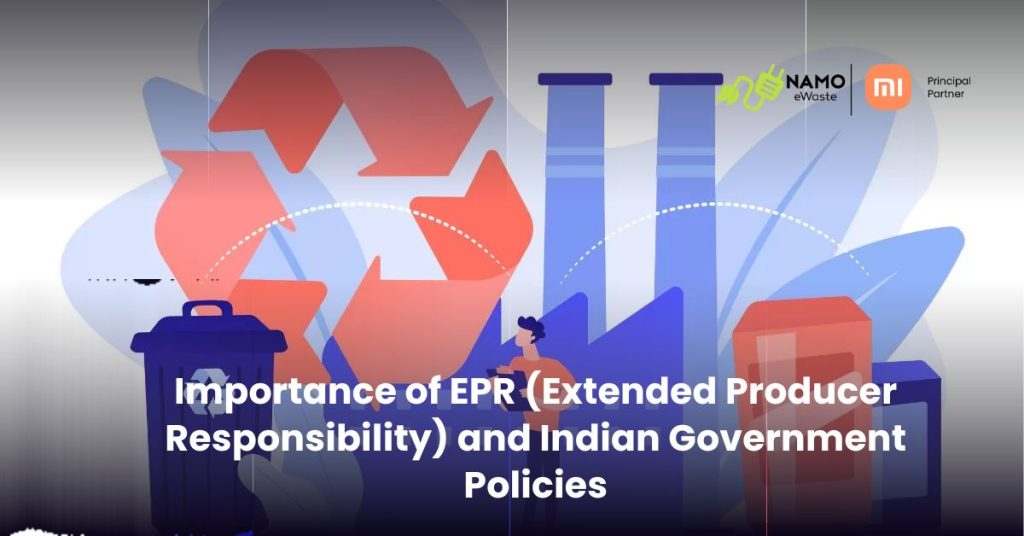What is EPR?
Did you know that by 2050, India is expected to generate 165 million tons of electronic waste annually? That’s a staggering amount of waste, and it highlights the urgent need for effective waste management policies like Extended Producer Responsibility and importance of . Extended Producer Responsibility (EPR) is a policy that requires producers, importers, manufacturers, and brand owners to take responsibility for the entire lifecycle of their products, including their end-of-life management.
This provides incentives to reduce waste, encourage environmentally friendly product design, and waste management in general. The importance of EPR in managing e-waste is further highlighted by the fact that many valuable materials and resources can be recovered and reused through proper e-waste management, reducing the need for virgin materials and supporting a more sustainable economy.
In India, the importance of EPR is particularly relevant for the management of waste electrical and electronic equipment (WEEE), which includes items such as computers, mobile phones, and other electronic devices. The stakeholders in this are the Producers, Producer Responsibility Organizations (PROs), dismantlers, recyclers, and refurbishers, add transporters and collection locations/centres.
E-waste, Rising Risks and Responsibilities
Currently, more than 50 million tonnes of eWaste is produced every year. In India, only 22.7% of electronic waste is collected, processed, and disposed of properly, leaving the rest to pollute landfills and soil. It is crucial to implement effective e-waste management due to the toxic chemicals, heavy metals, and harmful substances present in electronic waste, including cadmium, chromium, and lead, which can cause health problems such as damage to the lungs, liver, respiratory system, and brain, as well as an increased risk of cancer. Hence, it is important to comply with EPR for eWaste management and a better future.
EPR for e-waste management and its compliance requires producers and importers to collect, treat, and recycle electronic items in an environmentally-friendly manner.
Additionally, manufacturers must ensure that their electronic products meet RoHS (Hazardous Substance Reduction) compliance standards before they are sold.They must work with authorised recyclers and PROs only, label electronic equipment properly and provide advice on how to handle end-of-life products.It also involves stocking and disposing of end-of-life devices in authorised collection centres.
EPR Policies in India
This approach reflects a commitment to sustainability. However, implementing EPR management for e-waste can be a complicated and time-consuming process. Like in accordance to the Indian government’s eWaste Management Act of 2016:
- Producers, importers, manufacturers, and brand owners are responsible for reducing e-waste pollution according to environmental guidelines.
- Rule 13 (1) of the 2016 Rules grants the Central Pollution Control Board (CPCB) the authority to issue, renew, or deny EPR.
- The CPCB (Central Pollution Control Board) oversees the enforcement of EPR and provides specific instructions for producers on managing e-waste, including recycling, storage, disassembly, and refurbishment.
EPR authorisation process
Hence industry professionals are often consulted for guidance and assistance. Especially to obtain EPR authorization which typically involves:
- Submitting an application to the CPCB for EPR authorization, providing details of the electronic products they produce, the quantities produced, and their end-of-life management plans.
- The CPCB reviews the application and may request additional information from the producer if necessary.
- If the CPCB is satisfied with the application, it will grant EPR authorization to the producer. The authorization will specify the producer’s responsibilities for the collection, treatment, and disposal of their electronic products at the end of their life.
- The producer must comply with the terms of their EPR authorization, including submitting regular reports to the CPCB on their end-of-life management activities.
This makes it increasingly important for the producers to take help of professionals to deal with the complex and time consuming process and take responsibility for their waste.
Key Takeaways
The importance of EPR, or Extended Producer Responsibility, in managing e-waste cannot be overstated. E-waste is a growing environmental concern, with millions of tons of discarded electronics posing a threat to the environment and human health. By implementing EPR programs, producers are held accountable for the entire lifecycle of their products, from design to disposal. This incentivizes producers to create products that are easier to recycle and dispose of responsibly, reducing the amount of e-waste that ends up in landfills or being illegally exported.
Furthermore, EPR programs promote a more sustainable and circular economy, as materials are reused and recycled rather than being discarded. Overall, the importance of EPR in managing e-waste is crucial in ensuring a healthier and more sustainable future for our planet.
The implementation of Extended Producer Responsibility (EPR) policies are important for eWaste management, to promote sustainable practices, and protect public health and the environment. However, due to the complex process, businesses may require the expertise of industry professionals to ensure they are meeting their responsibilities. By working together and investing in the necessary expertise, we can all do our part to manage e-waste responsibly and create a cleaner, more sustainable future for India.


